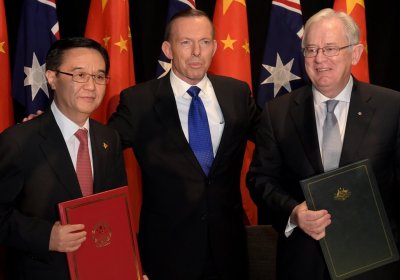As the pantomime that is the Royal Commission into Trade Union Governance and Corruption, stumbles to its conclusion at the end of the year, figures released by the Australia Bureau of Statistics (ABS) on October 27 reveal a 2% drop in union membership to 15% of the workforce.
According to the ABS report, in August last year 1.6 million people were members of trade unions in their main job.
China Australia Free Trade Agreement (ChAFTA)
In our “A World to Win” series, Resistance: Young Socialist Alliance seeks to give voice to the ideas and demands of radical young people involved in the struggle to make the world a better place.
In this week's article, Stanley Blair argues that the international border system exacerbates the injustice of capitalism and that we need open borders.
* * *
Around the world, political discussion has become increasingly concerned with immigration. The Australian establishment has been a world leader in immigration scaremongering for the past decade.
The China Australia Free Trade Agreement (ChAFTA) is a major deal, but there is little public understanding of its content. Much of the coverage of ChAFTA in the corporate media has focused on its benefits for business and its impact on Australia. But ChAFTA has far reaching consequences for working people in both countries.
The Chinese and Australian governments signed off on ChAFTA on June 17. But before it can come into effect, both the Australian and Chinese governments need to pass enabling legislation.
More than 800 workers gathered in Bicentennial Park on August 23 to protest against the China-Australia Free Trade Agreement in a rally organised by the Electrical Trades Union (ETU).
ETU National Secretary Allen Hicks told the crowd Chinese companies need invest only 15% in a project worth at least $150 million to be able to bring in workers from overseas who are not subject to labour market testing.
For as little as $22.5 million, a Chinese investor in a joint venture with an Australian company can avoid paying Australian wages and conditions.
About 5000 trade unionists rallied in front of NSW Parliament House on July 31 as part of a round of nation-wide actions against the secretly negotiated and recently signed China-Australia Free Trade Agreement.
Unions object to provisions that will undermine working conditions and safety and point to powers — like those in the Trans Pacific Partnership (TPP) agreement, which is still in secret negotiation — that allow big corporations to sue signatory governments for damages arising out of laws and regulations adopted to protect jobs or the environment.
The union movement’s opposition to the China Australia Free Trade Agreement (ChAFTA) has ratcheted up since the agreement was signed in Canberra on June 17.
ChAFTA allows for 95% of Australian exports to China to be tariff free. These will include many agricultural products, including beef and dairy. In addition, there will be liberalisation of market access for the Australia's services sector, and investments by private companies from China under A$1.078 billion will not be subject to Foreign Investment Review Board approval.





